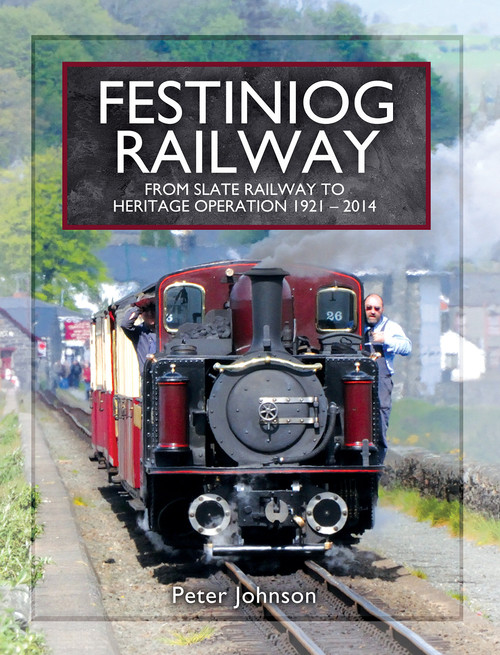FESTINIOG LAW: The Shaping of a Pioneering Railway
by Stephen Murfitt
Much has been written about the acclaimed engineers and surveyors of the Festiniog Railway Company (FRCo), the oldest statutory railway company in the world still in operation. However, numerous personalities within the legal sector, including senior members of the judiciary, who have contributed to the development of the pioneering company, have received little attention to date. This book seeks to remedy the omission by offering a novel perspective on the Ffestiniog Railway's history and demonstrating the considerable influence of the law and its institutions on the shaping of FRCo.
Dr Stephen Murfitt LLB, LLM, PhD is a lawyer with a particular interest in the early railways. Now semi-retired, he was formerly Chair of the Board and Senior Partner of a national firm of solicitors. He has presented papers at International Early Railway Conferences and in 2017 was awarded a PhD from the University of York for his thesis "The English Patent System and Early Rallway Technology 1800-1852.' Stephen is a non-executive company director and a charity trustee of standard gauge railway organisations and has been involved with the narrow gauge Ffestiniog Railway for many years, commencing as a volunteer locomotive fireman. Since 1994 he has been honorary solicitor and clerk to the FRCO, and since 2006 a statutory director.
Foreward:
Back in 1965 the Railway & Canal Historical Society published its first book, a slim volume of mine entitled How Ffestiniog got its Railway. Here now is the Society’s latest publication, which deals once again with the same famous line. The Festiniog Railway Company, as the oldest railway company in the world that is still in operation, has a proud and multi-faceted history. But the present book is no ordinary addition to its bibliography, for it deals with one aspect of its long life to which previous accounts have paid too little attention.
Anyone who thinks that such matters are peripheral, and that spelling them out threatens to be as dry as dust, is simply wrong. On the contrary, these proceedings are not only fundamental to the railway’s history but fascinating in their own right. More than that: these tales, as told here, are also authoritative. To be worthwhile, any book on a subject like this can only be produced by a lawyer, and Stephen Murfitt is the horse’s mouth. Having been solicitor and Company Secretary to the Railway Company since 1994, he has written a book that does us, and the railway, a most valuable service.
ISBN: 978-0-901461-74-2
RAILWAY & CANAL HISTORICAL SOCIETY
www.rchs.org.uk
9-780901-461742
A couple of reviews
“This is an unusual, fascinating and well researched book. It is different from the majority of railway books in that the author, Stephen Murfitt is qualified in law and has chosen to share his skill with us by giving an account of the more important aspects of railway law as it influenced the development of the Ffestiniog and Welsh Highland Railways (FWHR), from the inception of the Festiniog Railway Company in 1832 to the present day.
Whilst the book concentrates on the FWHR, the content is relevant to railways the world over, in that legal precedents have been set by the Festiniog Railway Company in its complex evolution.
For example; as a footplate volunteer on the railway, I was always struck by the importance placed by the company on spark arrestor daily inspections and the absolute ban on volunteers doing anything other than cleaning them. This book explains the precise reasons for the insistence on this procedure and how it subsequently affected all railways.
Many other examples of the influence of law on construction, operation, carriage rates, accidents, civil disputes and compensation are expounded in an understandable style.
We learn how close we came to losing the FWHR in its entirety and how it was saved on several occasions. We learn the importance of the Light Railways Act and others.
This book includes the story of the rebuilding of the Welsh Highland Railway and the intricate legal complexities that surrounded the accomplishment.
This is a book that I heartily recommend. I could enthuse at length but I am going away to start reading it again.”
"This is brilliant book. I would never have expected to put a volume with such a dry-sounding title into the "couldn't put it down" category, but Ffestiniog Law comes over as a thriller rather than than a legal tome. What else can possible intervene to prevent the FR/WHR reopenings? But more and more obstructions kept appearing, as each new chapter reveals, and all were by numerous miracles overturned. Stephen Murfitt explains the multitude of complex situations and cliff-hanger outcomes clearly and straightforwardly."





